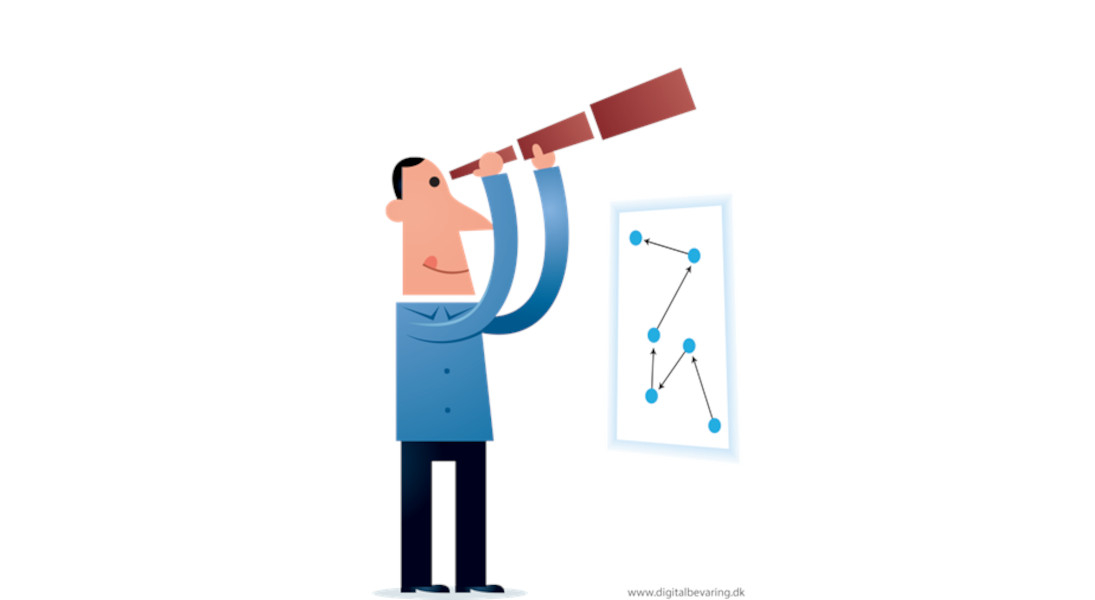- Also in this section
Events Calendar
Digital preservation for an uncertain future

Check your local time for the event here.
The main reason we preserve digital content is to facilitate the future use of that content - whether that future is next week, or hundreds of years from now. We have to make difficult decisions about how best to meet that goal, and one of the reasons these decisions are so hard to make is that it is impossible to test the longer-term outcomes. As a result, we focus on shorter term planning cycles and more measurable goals, considering our work in digital preservation to be more of a relay race than a marathon. If we make short-term decisions now, we can hope to safely pass our digital content on to our successors who will take new decisions based on changing needs and requirements and the evolving technical and social landscape.
There is logic behind our short term planning cycles, despite the long term goals of our discipline, but it is also helpful to think more creatively about the future and how this relates to our work in digital preservation. In his book ‘The Theory and Craft of Digital Preservation’ Trevor Owens encourages us to think like a futurist, he suggests we “look to the past trends in the ebb and flow of the development of digital media and hedge our bets on how digital technologies of the future will play out”. Beyond the technology, there are also other (perhaps bigger) questions to consider - what will society look like in the longer term future and what sort of environment will we be living in?
There is no doubt there are challenges to planning ahead, not least of which is the lack of space to step away from the day-to-day tasks and think creatively about the longer term future and how this impacts our work, but also as noted by UNESCO, we sometimes lack the basic literacy around future thinking that is needed to do this
This event provides an opportunity to consider the future and how it relates to our work to preserve digital content. It brings together a range of speakers to stimulate debate and discussion. Our speakers will be Trevor Owens (Chief Research Officer at the American Institute of Physics) who will draw out some of the themes from his latest book ‘After Disruption: A Future for Cultural Memory’; George Oates (Executive Director) and Alex Chan (Tech Lead) (both of the Flickr Foundation) who will share early thinking around establishing a 100 year plan for the future of the photo sharing platform, Flickr; Thomas Keating (Postdoctoral Researcher at Linköping University) who will discuss his work on technology, speculative thinking, and nuclear memory communication and finally Keith Pendergrass (Digital Archivist at Harvard Business School) who will discuss some new ways of thinking about digital preservation in the context of environmental change.
This thought-provoking event will include opportunities for Q&A with all the speakers and wider community discussion on the themes that are raised.
Agenda (times in UTC)
14:00 - Welcome and introductions
14:10 - Manifesting Sustainable and Durable Institutions With Digital Preservation at their Core - Trevor Owens, Chief Research Officer at the American Institute of Physics
14:40 - Flickr.org: Designing a new organization with a 100-year outlook - George Oates and Alex Chan, Executive Director and Tech Lead at the Flickr Foundation
15:10 - break
15:30 - How to Communicate Across 100 Millenia? On nuclear memory and the management of uncertain futures - Thomas Keating, Postdoctoral Researcher at Linköping University
16:00 - Centering Sustainability: A new model for digital stewardship - Keith Pendergrass, Digital Archivist at Harvard Business School
16:30 - Discussion
16:55 - Next steps
17:00 - Close
An event on this theme will also be run at a time suitable for the Australasia and Asia Pacific regions.
Recordings (DPC Members and Supporters, please log in to view)
All presentations will be recorded and made available to DPC Members and Supporters via this web page after the event (login to DPC website required).
Recordings will also be shared with non-members who pay to attend the event.
Please note – DPC Members do not need to register in order to access the recordings after the event.
DPC Inclusion & Diversity Policy
The DPC Community is guided by the values set out in our Strategic Plan and aims to be respectful, welcoming, inclusive and transparent. We encourage diversity in all its forms and are committed to being accessible to everyone who wishes to engage with the topic of digital preservation, whilst remaining technology and vendor neutral. We ask all those who are part of this community to be positive, accepting, and sensitive to the needs and feelings of others in alignment with our DPC Inclusion & Diversity Policy.
Event Location: Online
- Also in this section